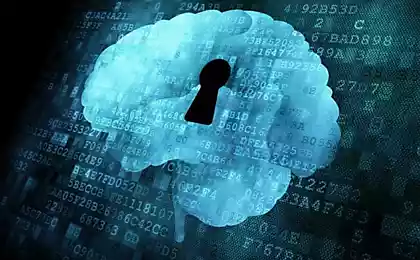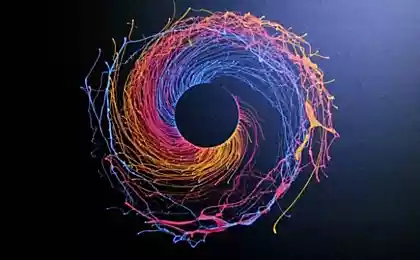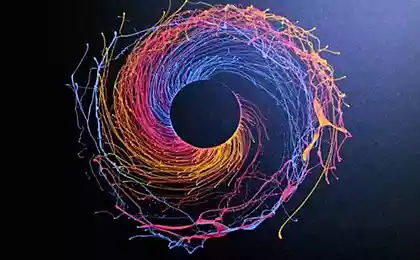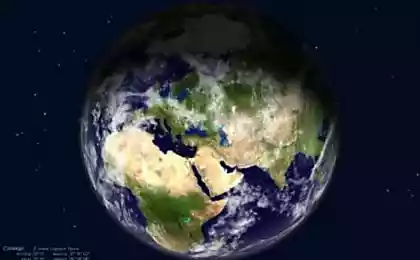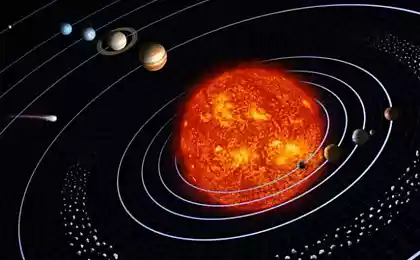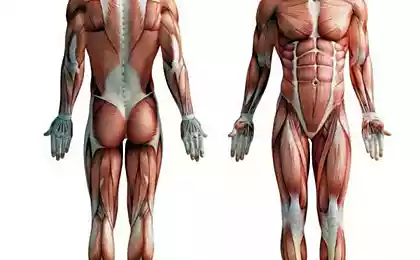965
10 simple questions that scientists still can not find answers
Science has answered many of the fundamental questions, but some areas of reality are still "white spots" even for the scientists themselves. Why have the force of gravity? As domestic fish can predict earthquakes? Why do people yawn? Here is a selection of interesting questions, answers to which modern scientific knowledge is not giving.
1. Why do we yawn? 28,924,925
On this score there are many theories, including the most ridiculous. Noteworthy are the two as the most probable.
The first states that yawning helps to remove stress from the brain and improve its performance. That is why, according to psychologists at the University of Albany in New York, we usually yawn before sleep - by the time the performance of the brain is reduced, the same observed in the lack of sleep.
But if only a yawning helps to "whip up" our brain, why it is so contagious? Proponents of the theory respond that it went more from our ancestors, when leader of the pack yawning, thus showing that there is not currently in the best form, the whole flock begins to do the same thing, so to speak, raise collective vigilance before identify potential threat.
The second theory is that yawning brings together and how to make people sympathize with each other - zevnuvshy behind someone if subconsciously wants to say: "Yes, my friend, as I understand you».
2. Why do people sometimes ignite spontaneously? 16,713,648
All that the science on this issue knows for sure - people sometimes really flare up like matches.
One of the first officially recorded victims of spontaneous combustion was the Italian knight middle of XVII-th century of the lord came on fire after excessive drinking of wine. Over the centuries, there have been about 120 known cases, but many scientists believe, can not be attributed to spontaneous combustion. Among the victims were a lot of smokers, and one interesting theory is that smoking can burn the deeper layers of skin and cause ignite the layer of subcutaneous fat - all together it's like the principle of candles and wicks.
An alternative theory says that the reason for the terrible outbreaks is methane that accumulates in the intestine, and the "spark" gives a certain interaction of enzymes.
Two of these explanations have one problem - the scientists can not test them, so the answer to the question, why is this happening yet.
3. How does the placebo effect? 56,439,279
When a new drug is in clinical trials among volunteers is always a so-called control group, which serve as indicators of the scientists point of reference. Her party states that give them the test drug, but in reality they get only slightly tinted "dummy" - a placebo (lat. Placebo - «like me»).
Some of the volunteers "feel" the effect of the drug, which supposedly gives them, moreover, have objectively documented effects of placebo, corresponding to the action of the drug. Many believe that people sometimes say about feeling better, but these are just trying to convince himself.
Conflicting evidence give rise to numerous theories: Pavlov's followers, for example, say that the patient is at the physiological level creates the conditions of recovery after treatment should help. Some speak of the therapeutic effect of communicating with the doctor, the other - the unconscious unwillingness to spoil the statistics of the experiment.
Be that as it may, the pharmaceutical giants dream to uncover the mystery of the placebo effect to make it impossible for profit scam selling dummies, because the development of these drugs is expensive and takes a long time, but because of self-hypnosis people, they sometimes can not compete with the "Dummy».
4. Who was the last common ancestor of? 18,640,676
Keith and bacteria, octopus and orchid - apparently, they have nothing in common, but if you dig deeper, you find that the similarities still there.
Almost all living things contain proteins and nucleic acids: in all living organisms contain genetic code, and the sequence of the human genome resembles a family tree - it says that all the diversity of life can be reduced to a single universal ancestor.
In theory, the calculation of the common ancestor will look deeper into the origins of life. Scientists say that the last universal ancestor (Eng. Last universal common ancestor - LUCA) of about 2, 9 billion years ago, gave the two branches of development - bacteria and eukaryotes (second later evolved into plants, animals, etc.). Unfortunately, the genetic material of the era quite meager, as repeatedly shuffled and changed during evolution.
But some preserved genetic properties of proteins and nucleic acids suggests whom LUCA It was like - a cell that make up all living organisms.
5. How does the memory of? 92,081,942
For a long time, scientists have assumed that the mechanisms of memory are enclosed in the hippocampus, cerebral cortex, or dispersed in an undefined group of neurons.
Scientists from the Massachusetts Institute of Technology for the first time able to manage memory of mice, affecting some neuronal connections. This is certainly a step forward, but as the brain determines which bundle you need to use? This "trick" is not fully understood: studies show that when a memory activates the same brain cells that are directly involved in the preparation of the experience, in other words, memory is not simply accumulate experiences and then "takes them out" - it's more like design "of the most" of the situation.
6. Is it true that animals predict earthquakes? 23,428,551
The idea is good, but scientists want proof.
The cases of the strange behavior of pets in front of some cataclysm known since the days of ancient Greece, but all these stories are in the nature of the anecdote, and in general, any behavior of the animal can be considered rather strange to talk about "predictions"? In addition, it has usually tell after the fact.
Undeniable fact that animals feel subtly changing environmental conditions - from seismic disturbances to the electromagnetic field, but it is unclear whether earthquakes are preceded by such changes. And if we ourselves can not predict an earthquake, when the need to start to fix the "strange" behavior of pets? More difficult to make an experiment, because it is necessary to arrange for the cataclysm. A few "happy" coincidence happened in Neftegorsk when the earthquake began during the experiments on animals, but the data obtained are quite contradictory.
7. Where parts of the body "know" that it is necessary to stop growing? 31,140,328
Each animal is composed of trillions of cells, at the beginning of the development it was only a single cell: the growth process is usually tightly controlled, but sometimes there are failures, it turns out, for example, that a person has one leg slightly shorter than the other. What does this affect?
Here are the main four proteins that become Salvadoran warty behemoth of a special "channels" send a signal that it is time to stop the development of organs. The signal suspends production of a protein that serves as a building material, and this is the concrete representation of scientists conclude. What generates a signal? What mechanisms of growth, in addition to the production of the protein it affects? Scientists also continue to study these "channels of communication", suggesting that it will be possible to "switch off" the mechanism of dividing cancer cells.
8. Are there human pheromones? 14,751,051
Do you recognize the smell of someone else's fear? Can you, for example, to feel at a distance of a rat? Animals have long and successfully communicate on the level of chemical signals, but whether it is capable of man? Some say the undoubted change in the behavior and reactions of the human physiology at chemosignals, but so far it is impossible to say exactly what is the initiator of these changes. Let inscriptions on spirits and shower gels say that it is a means of "pheromone" will make you irresistible, scientists do not yet know any of pheromones can affect a person. Even if some "chemical signals" a man exists, it is not clear how "decodes" the signal receiving side. In mammals, reptiles, and this goal is the vomeronasal organ, which also is present among us, but it has olfactory function, and its sensory cells are not associated with the central nervous system.
9. How does gravity? 12,073,134
There are four fundamental forces of the universe do not produce "fall apart": electromagnetism, the strong and weak nuclear force and gravity. The gravity of these four - the least noticeable, which is why it is not easy to study the properties by using small objects, in laboratory conditions, but, for example, the strong nuclear force to more than 1026 times weaker. Despite all the efforts of physicists to explain the phenomenon of gravity of objects to each other, using the principles of quantum mechanics and general relativity, the essence of this interaction is not clear to the development of a united theory of everything.
It is also unclear what has caused the gravitational interaction between objects: the case can only help the construction of the set super-colliders to detect the hypothetical graviton - elementary massless particle-carrier of the gravitational interaction. Some scientists are trying to find evidence of its existence, while others believe that it is only confuse everything.
10. How many species on Earth? 69,662,046
Scientists have about 200 tons of years make a general classification and description of the various animal species known to science, and will be completed this great work, probably not soon.
Only in the last decade, it was announced the discovery of more than 16 thousand new species of animals and is classified at the moment about 1, 2 million. How many more there are of unknown organisms?
On this basis, we can calculate that about 300 thousand people need to devote his life to cataloging all life - this is an extremely long and laborious process, because many areas of habitat for many unstudied species are located in developing countries, where to conduct research is problematic, as 80% of living beings and did live in the deep ocean.
With this in mind, several groups of scientists give differing estimates of the number of species that are yet to be discovered - the numbers range from 19,264 to about 15 million.
via factroom.ru
1. Why do we yawn? 28,924,925
On this score there are many theories, including the most ridiculous. Noteworthy are the two as the most probable.
The first states that yawning helps to remove stress from the brain and improve its performance. That is why, according to psychologists at the University of Albany in New York, we usually yawn before sleep - by the time the performance of the brain is reduced, the same observed in the lack of sleep.
But if only a yawning helps to "whip up" our brain, why it is so contagious? Proponents of the theory respond that it went more from our ancestors, when leader of the pack yawning, thus showing that there is not currently in the best form, the whole flock begins to do the same thing, so to speak, raise collective vigilance before identify potential threat.
The second theory is that yawning brings together and how to make people sympathize with each other - zevnuvshy behind someone if subconsciously wants to say: "Yes, my friend, as I understand you».
2. Why do people sometimes ignite spontaneously? 16,713,648
All that the science on this issue knows for sure - people sometimes really flare up like matches.
One of the first officially recorded victims of spontaneous combustion was the Italian knight middle of XVII-th century of the lord came on fire after excessive drinking of wine. Over the centuries, there have been about 120 known cases, but many scientists believe, can not be attributed to spontaneous combustion. Among the victims were a lot of smokers, and one interesting theory is that smoking can burn the deeper layers of skin and cause ignite the layer of subcutaneous fat - all together it's like the principle of candles and wicks.
An alternative theory says that the reason for the terrible outbreaks is methane that accumulates in the intestine, and the "spark" gives a certain interaction of enzymes.
Two of these explanations have one problem - the scientists can not test them, so the answer to the question, why is this happening yet.
3. How does the placebo effect? 56,439,279
When a new drug is in clinical trials among volunteers is always a so-called control group, which serve as indicators of the scientists point of reference. Her party states that give them the test drug, but in reality they get only slightly tinted "dummy" - a placebo (lat. Placebo - «like me»).
Some of the volunteers "feel" the effect of the drug, which supposedly gives them, moreover, have objectively documented effects of placebo, corresponding to the action of the drug. Many believe that people sometimes say about feeling better, but these are just trying to convince himself.
Conflicting evidence give rise to numerous theories: Pavlov's followers, for example, say that the patient is at the physiological level creates the conditions of recovery after treatment should help. Some speak of the therapeutic effect of communicating with the doctor, the other - the unconscious unwillingness to spoil the statistics of the experiment.
Be that as it may, the pharmaceutical giants dream to uncover the mystery of the placebo effect to make it impossible for profit scam selling dummies, because the development of these drugs is expensive and takes a long time, but because of self-hypnosis people, they sometimes can not compete with the "Dummy».
4. Who was the last common ancestor of? 18,640,676
Keith and bacteria, octopus and orchid - apparently, they have nothing in common, but if you dig deeper, you find that the similarities still there.
Almost all living things contain proteins and nucleic acids: in all living organisms contain genetic code, and the sequence of the human genome resembles a family tree - it says that all the diversity of life can be reduced to a single universal ancestor.
In theory, the calculation of the common ancestor will look deeper into the origins of life. Scientists say that the last universal ancestor (Eng. Last universal common ancestor - LUCA) of about 2, 9 billion years ago, gave the two branches of development - bacteria and eukaryotes (second later evolved into plants, animals, etc.). Unfortunately, the genetic material of the era quite meager, as repeatedly shuffled and changed during evolution.
But some preserved genetic properties of proteins and nucleic acids suggests whom LUCA It was like - a cell that make up all living organisms.
5. How does the memory of? 92,081,942
For a long time, scientists have assumed that the mechanisms of memory are enclosed in the hippocampus, cerebral cortex, or dispersed in an undefined group of neurons.
Scientists from the Massachusetts Institute of Technology for the first time able to manage memory of mice, affecting some neuronal connections. This is certainly a step forward, but as the brain determines which bundle you need to use? This "trick" is not fully understood: studies show that when a memory activates the same brain cells that are directly involved in the preparation of the experience, in other words, memory is not simply accumulate experiences and then "takes them out" - it's more like design "of the most" of the situation.
6. Is it true that animals predict earthquakes? 23,428,551
The idea is good, but scientists want proof.
The cases of the strange behavior of pets in front of some cataclysm known since the days of ancient Greece, but all these stories are in the nature of the anecdote, and in general, any behavior of the animal can be considered rather strange to talk about "predictions"? In addition, it has usually tell after the fact.
Undeniable fact that animals feel subtly changing environmental conditions - from seismic disturbances to the electromagnetic field, but it is unclear whether earthquakes are preceded by such changes. And if we ourselves can not predict an earthquake, when the need to start to fix the "strange" behavior of pets? More difficult to make an experiment, because it is necessary to arrange for the cataclysm. A few "happy" coincidence happened in Neftegorsk when the earthquake began during the experiments on animals, but the data obtained are quite contradictory.
7. Where parts of the body "know" that it is necessary to stop growing? 31,140,328
Each animal is composed of trillions of cells, at the beginning of the development it was only a single cell: the growth process is usually tightly controlled, but sometimes there are failures, it turns out, for example, that a person has one leg slightly shorter than the other. What does this affect?
Here are the main four proteins that become Salvadoran warty behemoth of a special "channels" send a signal that it is time to stop the development of organs. The signal suspends production of a protein that serves as a building material, and this is the concrete representation of scientists conclude. What generates a signal? What mechanisms of growth, in addition to the production of the protein it affects? Scientists also continue to study these "channels of communication", suggesting that it will be possible to "switch off" the mechanism of dividing cancer cells.
8. Are there human pheromones? 14,751,051
Do you recognize the smell of someone else's fear? Can you, for example, to feel at a distance of a rat? Animals have long and successfully communicate on the level of chemical signals, but whether it is capable of man? Some say the undoubted change in the behavior and reactions of the human physiology at chemosignals, but so far it is impossible to say exactly what is the initiator of these changes. Let inscriptions on spirits and shower gels say that it is a means of "pheromone" will make you irresistible, scientists do not yet know any of pheromones can affect a person. Even if some "chemical signals" a man exists, it is not clear how "decodes" the signal receiving side. In mammals, reptiles, and this goal is the vomeronasal organ, which also is present among us, but it has olfactory function, and its sensory cells are not associated with the central nervous system.
9. How does gravity? 12,073,134
There are four fundamental forces of the universe do not produce "fall apart": electromagnetism, the strong and weak nuclear force and gravity. The gravity of these four - the least noticeable, which is why it is not easy to study the properties by using small objects, in laboratory conditions, but, for example, the strong nuclear force to more than 1026 times weaker. Despite all the efforts of physicists to explain the phenomenon of gravity of objects to each other, using the principles of quantum mechanics and general relativity, the essence of this interaction is not clear to the development of a united theory of everything.
It is also unclear what has caused the gravitational interaction between objects: the case can only help the construction of the set super-colliders to detect the hypothetical graviton - elementary massless particle-carrier of the gravitational interaction. Some scientists are trying to find evidence of its existence, while others believe that it is only confuse everything.
10. How many species on Earth? 69,662,046
Scientists have about 200 tons of years make a general classification and description of the various animal species known to science, and will be completed this great work, probably not soon.
Only in the last decade, it was announced the discovery of more than 16 thousand new species of animals and is classified at the moment about 1, 2 million. How many more there are of unknown organisms?
On this basis, we can calculate that about 300 thousand people need to devote his life to cataloging all life - this is an extremely long and laborious process, because many areas of habitat for many unstudied species are located in developing countries, where to conduct research is problematic, as 80% of living beings and did live in the deep ocean.
With this in mind, several groups of scientists give differing estimates of the number of species that are yet to be discovered - the numbers range from 19,264 to about 15 million.
via factroom.ru
A long chain of beads can "levitate"
On the River Tees is held annually amazing natural "show" in the mating season mayflies

